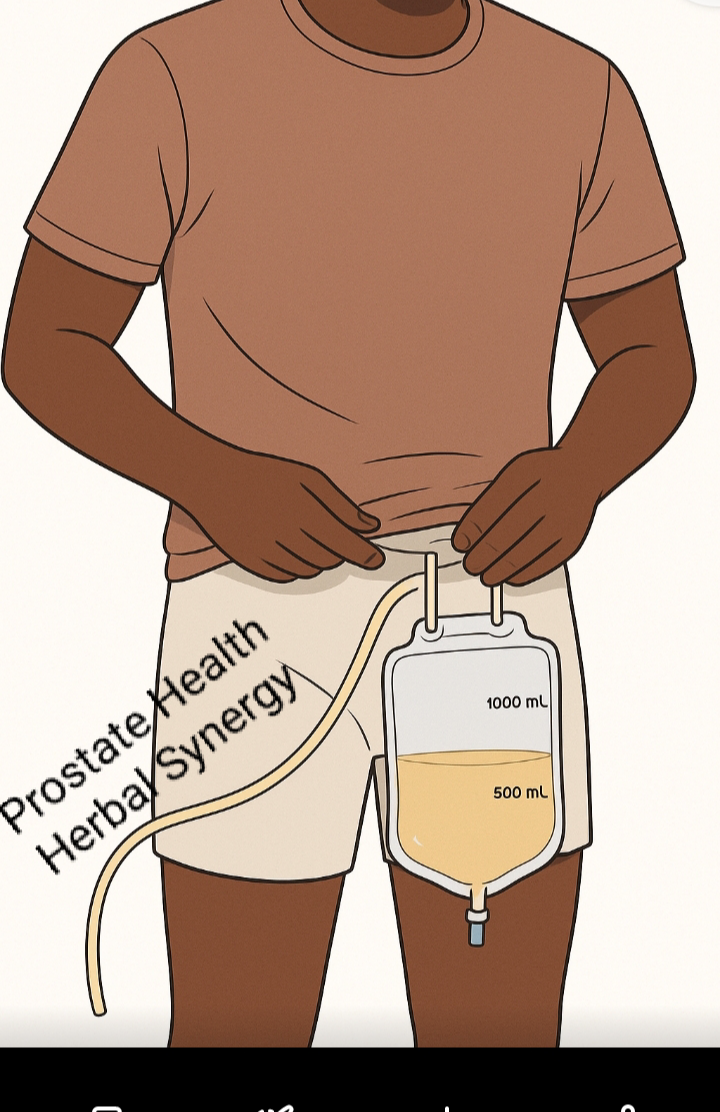Herbs Build Lasting Energy
Herbs Build Lasting Energy Why Tropical Herbs Build Lasting Energy By Ekpuk Jumbo, Founder of CombiHs CombiHs — Natural Synergy

CombiHs Prostate Herbal Solution:
Natural Prostate Health Synergy with CombiHs is Evidence-Based Herbal Solution
Introduction
Prostate disorders are among the most common health challenges facing men, particularly those over the age of 45.
Moreover, research shows that more than half of men in their fifties experience some form of prostate enlargement, and the percentage increases with age.
While conventional treatments focus largely on managing symptoms, they often leave the root causes unaddressed.
At CombiHs Health Services, we believe that true wellness comes from treating the underlying issues.
Therefore, our solution, known as CombiHs (Combined Herbal Synergies), is an evidence-based herbal formula designed to restore prostate health naturally.
Likewise blending scientifically supported herbs, which targets nutritional deficiencies, reduces inflammation, and balances hormones.
Visit our blog other herbal information
H2
Understanding Prostate Disorders
What is the Prostate?
The prostate is a small, walnut-sized gland located below the bladder.
Its primary role is producing fluid that nourishes and protects sperm.
In fact, despite its size, it plays an essential role in male reproductive and urinary health.
Common Prostate Conditions
Firstly, Benign Prostatic Hyperplasia (BPH): Enlargement of the prostate leading to difficulty urinating, frequent urination, or weak urine flow.
Secondly, Prostatitis: Inflammation of the prostate often caused by infection or chronic irritation.
Thirdly, Prostate Cancer: Abnormal cell growth in the prostate, one of the most common cancers in men.
Root Causes of Prostate Disorders
Nutritional Deficiencies: Low levels of zinc, selenium, and lycopene hinder hormone regulation and antioxidant defense.
Consequently, men may experience worsening symptoms.
Chronic Inflammation: Triggered by toxins, infections, and unhealthy diets, persistent inflammation damages prostate tissue.
Hormonal Imbalance: Excessive conversion of testosterone into dihydrotestosterone (DHT) by the enzyme 5-alpha reductase contributes to enlargement and symptoms. For example, elevated DHT is often observed in men with BPH.
H3
The CombiHs Root-Cause Approach
What is CombiHs?
CombiHs stands for Combined Herbal Synergies. Unlike single-herb supplements, this formula combines multiple herbs that work better together than individually.
This principle is called herbal synergy.
Why Herbal Synergy Matters.
The herbs complement each other’s strengths.
Also it lower doses are needed, reducing side effects.
Likewise multi-target action: such as antioxidant, anti-inflammatory, hormonal modulation, and urinary support.
Moreover, synergy allows a holistic approach to prostate health that conventional treatments often lack.
Conventional vs. CombiHs Approach
The conventional treatments is symptom suppression (medications, surgery).
While CombiHs targets root causes such as deficiencies, inflammation, DHT imbalance).
Therefore, CombiHs offers a holistic, sustainable path to prostate wellness.
H4
Evidence-Based Herbal Ingredients in CombiHs
CombiHs uses carefully selected herbs, each chosen for its scientifically documented role in supporting prostate health.
For instance, Saw Palmetto and Lycopene are among the key ingredients.
1. Saw Palmetto (Serenoa repens) ~20%
Action: Inhibits 5-alpha reductase, reducing DHT levels. Improves urinary flow and reduces BPH symptoms.
Evidence: Clinical trials show improvement in urinary symptoms and reduced prostate size.
Side effect: Mild stomach upset; remedy is to take with food.
2. Green Tea (Camellia sinensis) ~15%
Action: Rich in polyphenols; reduces oxidative stress and inflammation.
Evidence: Human studies show reduced risk of prostate cancer in populations with high green tea consumption.
Side effect: Excess caffeine may cause insomnia; use decaf extract if sensitive.
3. Tomatoes (Lycopene) ~10%
Action: Lycopene protects DNA and reduces oxidative stress. Works synergistically with selenium and vitamins.
Evidence: Epidemiological studies link high lycopene intake with lower prostate cancer risk.
Side effect: Excess intake may cause mild digestive upset.
4. Pumpkin Seeds (Cucurbita pepo) ~10%
Action: Contains beta-sitosterol, shown to block DHT binding, reduce swelling, and improve urinary flow.
Evidence: Clinical data supports use in reducing BPH symptoms.
Side effect: Rare mild gas or bloating; splitting doses helps.
5. Pygeum Bark (Prunus africana) ~8%
Action: Improves bladder emptying, reduces nocturia.
Evidence: Studies show reduced symptom scores in BPH patients.
Side effect: Occasional stomach upset; ensure high-quality extracts.
6. Turmeric (Curcuma longa) ~7%
Action: Curcumin is a powerful anti-inflammatory and antioxidant.
Evidence: Studies show curcumin reduces prostate inflammation.
Side effect: May cause mild stomach discomfort at high doses; combine with black pepper for absorption.
7. Ginger (Zingiber officinale) ~5%
Action: Anti-inflammatory, improves circulation to prostate tissue.
Evidence: Reduces inflammation markers, though direct prostate evidence is limited.
Side effect: May cause heartburn; take with meals.
8. Garlic (Allium sativum) ~5%
Action: Contains allicin; antioxidant and anti-microbial. Supports immune function.
Evidence: Some studies link garlic intake with reduced prostate cancer risk.
Side effect: May cause odor or stomach upset; aged garlic reduces this.
9. Nettle Root (Urtica dioica) ~5%
Action: Reduces BPH symptoms by blocking hormone binding in the prostate.
Evidence: Clinical evidence supports nettle use for urinary flow improvement.
10. Black Seed (Nigella sativa) ~5%
Action: Contains thymoquinone, anti-inflammatory and antioxidant.
Evidence: Preclinical studies support protective role in prostate tissue.
11. Corn Silk (Zea mays) ~5%
Action: Diuretic effect; improves urine flow and bladder comfort.
12. Pomegranate (Punica granatum) ~5%
Action: Rich in polyphenols; antioxidant and anti-inflammatory.
Evidence: Research suggests reduced PSA progression in men with prostate issues.
Indeed, the combination ensures multi-target support for men’s health.
H5
How CombiHs Works in the Body
Firstly as Anti-DHT & Hormone Modulation
Saw Palmetto, Pumpkin Seeds, and Pygeum reduce or block DHT activity.
Consequently, excessive growth of prostate tissue is prevented.
Secondly as Antioxidant & Cell Protection
Lycopene, Green Tea, Garlic, and Pomegranate protect prostate cells from oxidative DNA damage.
Thirdly as Anti-Inflammation & Immune Support
Turmeric, Ginger, and Green Tea reduce inflammatory cytokines.
Garlic and Black Seed strengthen immune defense.
Next as Detoxification & Urinary Flow
Nettle, Corn Silk, and Pygeum support urinary tract function.
As a result, toxins are eliminated and irritation is reduced.
H6
Benefits You Can Expect
Men who consistently use CombiHs at the correct dosage may experience:
1. Stronger urine flow and less urgency/frequency
2. Reduced night urination (nocturia)
3. Decreased pelvic discomfort
4. Balanced hormones with lower DHT activity
5. Enhanced energy and sexual vitality
6. Strengthened immune defense and antioxidant protection
Moreover, consistent use ensures long-term prostate wellness.
H7
Why Choose CombiHs
At TropicalHerbsNG.com, we have over 28 years of herbal practice and combine traditional wisdom with scientific evidence.
In addition to Quality Assurance: Each batch of CombiHs is lab-tested for purity and potency.
More over Expertise: Crafted by experienced herbal practitioners with decades of practice.
Above all Holistic Care: We educate and mentor patients toward lasting wellness.
Therefore, CombiHs delivers true herbal synergy—a formula greater than the sum of its parts.
H8
Call to Action
🌿 Don’t just manage prostate symptoms—restore balance naturally with CombiHs.
👉 Visit TropicalHerbsNG.com today to explore how CombiHs can support your prostate health and overall vitality.
In conclusion, herbal synergy combined with scientific evidence provides a safe, effective, and holistic approach to men’s wellness.
H9
References
1. Barry MJ. Clinical practice. Benign prostatic hyperplasia. N Engl J Med. 2001;345(18):1399–1405.
2. Wilt TJ, MacDonald R, Ishani A. Serenoa repens for benign prostatic hyperplasia. Cochrane Database Syst Rev. 2002.
3. Chen L, Stacewicz-Sapuntzakis M, Duncan C, et al. Lycopene and prostate cancer: Epidemiologic evidence and mechanistic basis. Am J Clin Nutr. 2001.
4. Green Tea and Prostate Cancer Risk: A Meta-analysis. Nutrients. 2017;9(5):E450.
5. Pygeum africanum for benign prostatic hyperplasia. Cochrane Database. 2002.
—
Herbs Build Lasting Energy Why Tropical Herbs Build Lasting Energy By Ekpuk Jumbo, Founder of CombiHs CombiHs — Natural Synergy

Explore traditional herbal wisdom and daily plant practices that promote balance, health, and lasting vitality for true herbal longevity.
We deliver core herbal procedure cures for our users for better and more efficient health value.
Lets discus your health
Connect with us